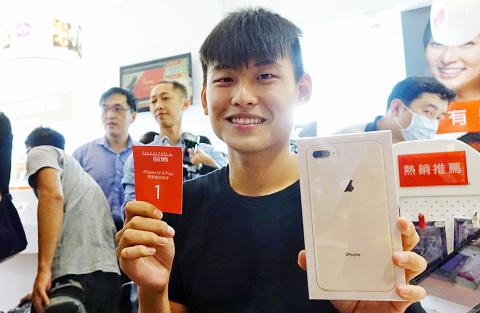Local telecom carriers yesterday saw muted launches of Apple Inc’s iPhone 8 and iPhone 8 Plus as consumers opted to wait for the arrival of the iPhone X, which offers a greater upgrade in specifications.
No major telecoms in Taiwan said they expect a supply crunch this year, which has been unusual in iPhone launch years since its debut in 2007.
“The line is shorter this year [compared with that for the iPhone 7 series], but we are satisfied with today’s launch, since Apple’s new iPhone series will come on two separate days this time,” Chunghwa Telecom Co (中華電信) chief executive of mobile services Tu Yuan-kuang (涂元光) told reporters.

Photo: Chang Chia-ming, Taipei Times
Chunghwa Telecom added that subscribers would receive their phones faster this year, as the company has obtained a sufficient supply, Tu said.
Far EasTone Telecommunications Co (遠傳電信), the nation’s No. 3 telecom, expects the combined sales of all the new iPhones to hit a record high, even though anticipation for the iPhone X would likely dampen initial sales of the iPhone 8 series.
“The upcoming iPhone X seems to have lowered consumers’ excitement for the iPhone 8, but this will be its first major replacement cycle after three years. Half of iPhone fans are still waiting for the arrival of the iPhone X,” Far EasTone chief sales and marketing officer Maxwell Cheng (鄭智衡) said.

Photo: Chang Chia-ming, Taipei Times
Cheng’s optimism was built on Far EasTone’s large number of iPhone users: About 1.3 million of the firm’s subscribers use iPhones, 30 percent of whom use the iPhone 6 series, which hit the market two years ago.
Those iPhone 6 users are the potential buyers of the new models, Cheng said.
Taiwan Mobile Corp (台灣大哥大), the nation’s No. 2 telecom, expects the iPhone 8 family to register a higher sales volume than its predecessor on the back of replacement demand, chief business officer Jeff Ku (谷元宏) said.
Taiwan Mobile is expected to sell 20,000 units from the iPhone 8 series during the first weekend, Ku said.

With an approval rating of just two percent, Peruvian President Dina Boluarte might be the world’s most unpopular leader, according to pollsters. Protests greeted her rise to power 29 months ago, and have marked her entire term — joined by assorted scandals, investigations, controversies and a surge in gang violence. The 63-year-old is the target of a dozen probes, including for her alleged failure to declare gifts of luxury jewels and watches, a scandal inevitably dubbed “Rolexgate.” She is also under the microscope for a two-week undeclared absence for nose surgery — which she insists was medical, not cosmetic — and is

CAUTIOUS RECOVERY: While the manufacturing sector returned to growth amid the US-China trade truce, firms remain wary as uncertainty clouds the outlook, the CIER said The local manufacturing sector returned to expansion last month, as the official purchasing managers’ index (PMI) rose 2.1 points to 51.0, driven by a temporary easing in US-China trade tensions, the Chung-Hua Institution for Economic Research (CIER, 中華經濟研究院) said yesterday. The PMI gauges the health of the manufacturing industry, with readings above 50 indicating expansion and those below 50 signaling contraction. “Firms are not as pessimistic as they were in April, but they remain far from optimistic,” CIER president Lien Hsien-ming (連賢明) said at a news conference. The full impact of US tariff decisions is unlikely to become clear until later this month

GROWING CONCERN: Some senior Trump administration officials opposed the UAE expansion over fears that another TSMC project could jeopardize its US investment Taiwan Semiconductor Manufacturing Co (TSMC, 台積電) is evaluating building an advanced production facility in the United Arab Emirates (UAE) and has discussed the possibility with officials in US President Donald Trump’s administration, people familiar with the matter said, in a potentially major bet on the Middle East that would only come to fruition with Washington’s approval. The company has had multiple meetings in the past few months with US Special Envoy to the Middle East Steve Witkoff and officials from MGX, an influential investment vehicle overseen by the UAE president’s brother, the people said. The conversations are a continuation of talks that

CHIP DUTIES: TSMC said it voiced its concerns to Washington about tariffs, telling the US commerce department that it wants ‘fair treatment’ to protect its competitiveness Taiwan Semiconductor Manufacturing Co (TSMC, 台積電) yesterday reiterated robust business prospects for this year as strong artificial intelligence (AI) chip demand from Nvidia Corp and other customers would absorb the impacts of US tariffs. “The impact of tariffs would be indirect, as the custom tax is the importers’ responsibility, not the exporters,” TSMC chairman and chief executive officer C.C. Wei (魏哲家) said at the chipmaker’s annual shareholders’ meeting in Hsinchu City. TSMC’s business could be affected if people become reluctant to buy electronics due to inflated prices, Wei said. In addition, the chipmaker has voiced its concern to the US Department of Commerce